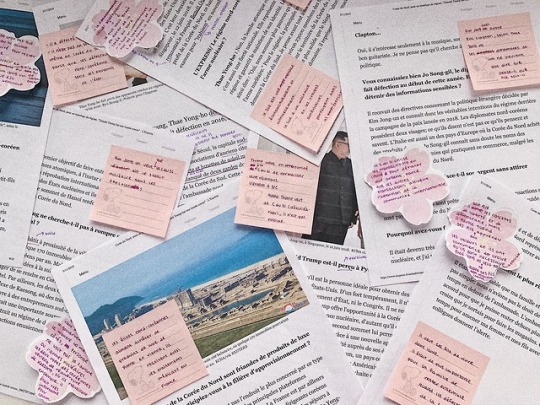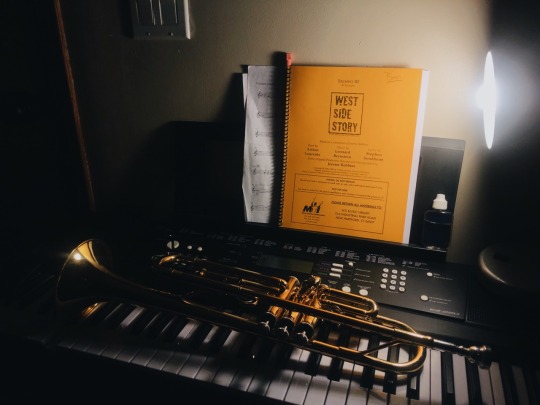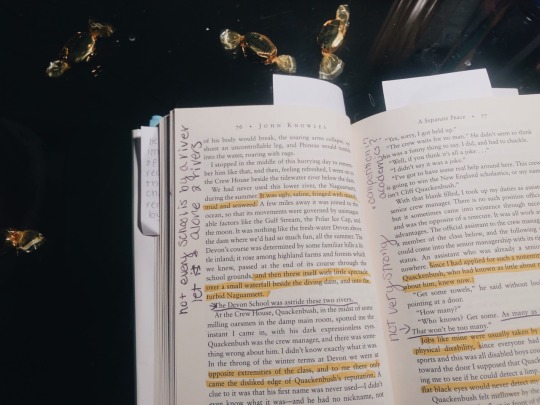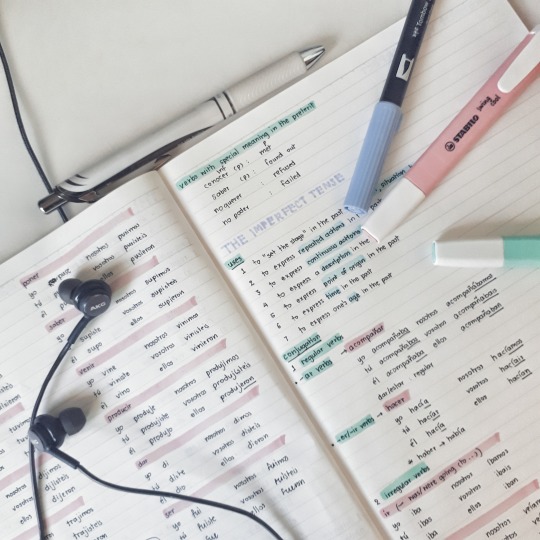Text
back to school reminders:
your grades don’t define you
mental health is a priority
not doing some homework assignments isn’t the end of the world
turn things in on time even if they aren’t completely done
you don’t need a perfect GPA to go to college
apply for scholarships
drama is exhausting; try to avoid it
ask for help when you need it
you aren’t stupid for not knowing everything
not every friend is a real one
teachers aren’t always right
everyone makes mistakes
you can do it
42K notes
·
View notes
Text
Be kind. Everyone is healing from something.
55K notes
·
View notes
Text

why did martha stewart pwn this cow 4 years ago
59K notes
·
View notes
Text
Note taking tips
Notebook for each class.
Have a separate notebook for each class. It keeps things organized. Plus, if you keep all of your classes’ notes in the same notebook and you lose that notebook, you’re pretty much SOL. Write clearly. If you’re going to handwrite your notes, make sure you can read them later. PenMANship. It’s got the word “man” in it, so it’s manly. Let go of perfectionism The purpose of note-taking is simple: to help you study better and more quickly. First, what’s new to you? There’s no point in writing down facts you already know. If you already know the Declaration of Independence was written and signed in 1776, there’s no reason to write that down. Anything you know you know you can leave out of your notes. Second, what’s relevant? What information is most likely to be of use later, whether on a test, in an essay, or in completing a project? Focus on points that directly relate to or illustrate your reading (which means you’ll have to have actually done the reading…). The kinds of information to pay special attention to are:
* Dates of events: Dates allow you to
a) create a chronology, putting things in order according to when they happened, and
b) understand the context of an event. For instance, knowing Isaac Newton was born in 1643 allows you to situate his work in relation to that of other physicists who came before and after him, as well as in relation to other trends of the 17th century.
* Names of people: Being able to associate names with key ideas also helps remember ideas better and, when names come up again, to recognize ties between different ideas whether proposed by the same individuals or by people related in some way.
* Theories: Any statement of a theory should be recorded — theories are the main points of most classes.
* Definitions: Like theories, these are the main points and, unless you are positive you already know the definition of a term, should be written down. Keep in mind that many fields use everyday words in ways that are unfamiliar to us.
* Arguments and debates: Any list of pros and cons, any critique of a key idea, both sides of any debate related in class or your reading should be recorded. This is the stuff that advancement in every discipline emerges from, and will help you understand both how ideas have changed (and why) but also the process of thought and development within the particular discipline you are studying.
* Images and exercises: Whenever an image is used to illustrate a point, or when an in-class exercise is performed, a few words are in order to record the experience. Obviously it’s overkill to describe every tiny detail, but a short description of a painting or a short statement about what the class did should be enough to remind you and help reconstruct the experience.
* Other stuff: Just about anything a professor writes on a board should probably be written down, unless it’s either self-evident or something you already know. Titles of books, movies, TV series, and other media are usually useful, though they may be irrelevant to the topic at hand; I usually put this sort of stuff in the margin to look up later (it’s often useful for research papers, for example). Pay attention to other student’s comments, too — try to capture at least the gist of comments that add to your understanding.
* Your own questions: Make sure to record your own questions about the material as they occur to you. This will help you remember to ask the professor or look something up later, as well as prompt you to think through the gaps in your understanding.
* Note-Taking Techniques: You don’t have to be super-fancy in your note-taking to be effective, but there are a few techniques that seem to work best for most people.
* Outlining: Whether you use Roman numerals or bullet points, outlining is an effective way to capture the hierarchical relationships between ideas and data. In a history class, you might write the name of an important leader, and under it the key events that he or she was involved in. Under each of them, a short description. And so on. Outlining is a great way to take notes from books, because the author has usually organized the material in a fairly effective way, and you can go from start to end of a chapter and simply reproduce that structure in your notes.For lectures, however, outlining has limitations. The relationship between ideas isn’t always hierarchical, and the instructor might jump around a lot. A point later in the lecture might relate better to information earlier in the lecture, leaving you to either
a) flip back and forth to find where the information goes best (and hope there’s still room to write it in)
b) risk losing the relationship between what the professor just said and what she said before.
* Mind-mapping: For lectures, a mind-map might be a more appropriate way of keeping track of the relationships between ideas. Here’s the idea: in the center of a blank sheet of paper, you write the lecture’s main topic. As new sub-topics are introduced (the kind of thing you’d create a new heading for in an outline), you draw a branch outward from the center and write the sub-topic along the branch. Then each point under that heading gets its own, smaller branch off the main one. When another new sub-topic is mentioned, you draw a new main branch from the center. And so on. The thing is, if a point should go under the first heading but you’re on the fourth heading, you can easily just draw it in on the first branch. Likewise, if a point connects to two different ideas, you can connect it to two different branches. If you want to neaten things up later, you can re-draw the map or type it up
* The Cornell System: The Cornell System is a simple but powerful system for increasing your recall and the usefulness of your notes. About a quarter of the way from the bottom of a sheet of paper, draw a line across the width of the page. Draw another line from that line to the top, about 2 inches (5 cm) from the right-hand edge of the sheet. You’ve divided your page into three sections. In the largest section, you take notes normally — you can outline or mind-map or whatever. After the lecture, write a series of “cues” into the skinny column on the right, questions about the material you’ve just taken notes on. This will help you process the information from the lecture or reading, as well as providing a handy study tool when exams come along: simply cover the main section and try to answer the questions. In the bottom section, you write a short, 2-3 line summary in your own words of the material you’ve covered. Again, this helps you process the information by forcing you to use it in a new way; it also provides a useful reference when you’re trying to find something in your notes later. Charting Method If your professor’s lecture will be focused on comparing and contrasting two or more ideas, you might consider using the charting method. Create a table in the note-taking program you’re using. Make as many columns as there are categories that you’re comparing and contrasting. Label each column with a category. As you listen to the lecture, record the notes under the appropriate category.
6K notes
·
View notes
Text
I hope all of you reach your goals this semester in school and make yourselves proud.
12K notes
·
View notes
Photo




[5/27/17]
My French teacher gave us these tips for studying a new language, so I typed them up for you guys! You can check out the original doc he gave us here
23K notes
·
View notes
Text
On the whole, the drug addicts at the library are nicer to me than the suburban moms who complain about them.
258 notes
·
View notes
Photo

What are some of your favorite quotes from the show?
168 notes
·
View notes
Text


07.08.19 → trying this out again. enjoy my very messy desk, i hope every1 has a lovelyyy day
1/100 days of productivity !
2K notes
·
View notes
Photo

[190516] my death month is over! woot! seriously, it feels like i had no time to take a breather so i’m sorry if my updates were sparse + short. i’m working on a huge final project now that spans across four of my classes and my first assignment, a french presentation, is next week! i’ll try to be a bit more regular now, but i don’t want to make any promises because there are only about 3 weeks until i’m done and it might get a little hectic before then… but for now enjoy these french notes on my final topic!
currently listening to: runaway by eric nam
2K notes
·
View notes
Photo


is there ‘the messiest studyblr’ contest because I think I could win it
5K notes
·
View notes
Photo

Castle Ashby, Northamptonshire
Inst @kasial91
103K notes
·
View notes
Text


august 5, 2019 | 3/100 days of productivity
I’ve decided to take the weekends off for this challenge, mostly as a way to ease into it. I might pick them pack up later on. but anyway, today I did some hardcore trumpet practice to prep for west side story pit, and attempted some summer reading homework.
💿 kiwi by harry styles
📚 a separate peace by john knowles
#new study blog#school#study#studyblr#studyblr community#studyspo#studying#currently reading#learning#mildliners#trumpet#west side story#summer reading
7 notes
·
View notes
Photo

Okay, so you’ve been called smart all your life. As a kid, you were one of the smartest in your class. Maybe you could read at a much higher level than your peers, or you could fly through multiplication drills like they were nothing. Then, you get to high school and suddenly you’re surrounded by lots of people who were ‘gifted kids’. None of what made you ‘special’ seems all that important now. Your work is actually challenging, and it’s actually requiring effort.
If you’re experiencing this, just know that so many students have gone through the same thing. Maybe it happens in high school, maybe college. But a lot of us who were considered gifted as kids suddenly run into this and it challenges our entire identity. It can be paralyzing, but it’s 100% possible to overcome it and succeed! I’ve compiled a few tips for ex-gifted kids dealing with impostor syndrome and self-doubt. I’m not a therapist, psychologist, or any sort of education expert. I’m just speaking to my own experiences, and I welcome any input from others who have insight into this as well!
1. Understand that working hard does not mean you aren’t intelligent. If something doesn’t come naturally to you, that’s not a reason to give up. Believing that people can do things “just because they were born with a talent for it” is only going to hurt you. It’s not true! People may have natural aptitudes for things, but hard work is involved even for the smartest or most talented people. You are capable of learning anything, and you don’t have to be “good at it” right away to do so.
2. Comparison will kill you. You are your only competition. Focusing on how you rank with other students, and comparing yourself to your classmates is going to exhaust you. By focusing on others, you can’t put your full energy into focusing on your work and yourself. You belong. Even if you struggle with your work, you belong. Focus on your own self-improvement and doing your best.
3. Don’t focus on the goal, focus on your current actions. If you’re always thinking about the future, and about whether you’ll get into that school or that program or win that award or get that scholarship, you’re not using that time to get work done. Don’t worry about college applications, just do your homework. Focus on what you are doing now to reach your goals so you can apply to schools with confidence later.
4. Your grades may not reflect intelligence, but they do reflect work ethic. Don’t let others convince you that grades mean nothing. They sure as hell mean a lot to colleges, and thinking that you should “reject the current education system” is not going to harm anyone but yourself. If you don’t feel like you’re learning anything in your high school classes, that’s all the more reason to want to get into a university that will challenge you. If you put effort into your work, it will not let you down. Your hard work will be reflected on your transcript. Don’t lose focus.
5. Talk to someone. Let people know if you’re struggling. It can be hard to feel like you aren’t allowed to identify as “smart” or to feel pressure to constantly compete and improve. I went to a highly competitive high school that pushed kids to cope in dangerous ways. This is not healthy and not okay. If you’re feeling overwhelmed you need to find healthy coping mechanisms. Speak with someone you trust and don’t let yourself spiral. Don’t try to self medicate. Your well being is always more important than your grades. Period.
6. Enjoy yourself. School may seem like hell, and you may feel like it will never end and you’ll always be stressed and worried. But high school is only four years, and you can do things during that time that you probably won’t ever again. Take advantage of things that seem fun, even if people think they’re nerdy or weird. Try and remind yourself that you’re lucky to have your education and you have the power to do great things with it. Don’t lose sight of your own ability and your bright future!
15K notes
·
View notes
